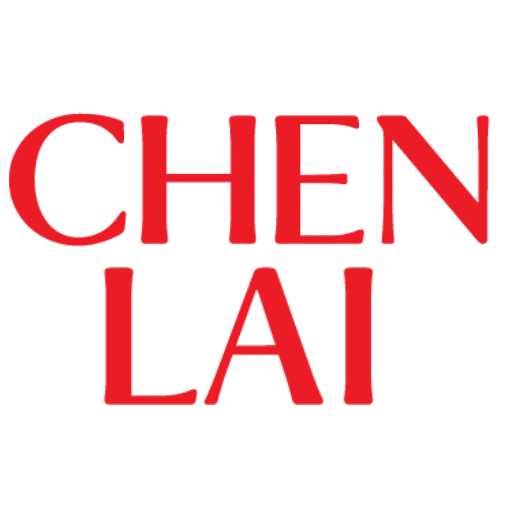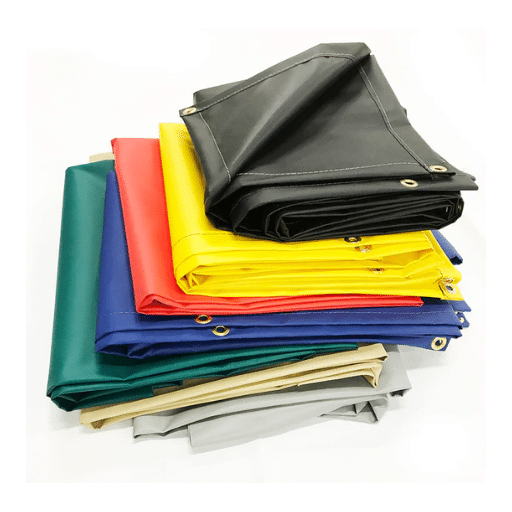Tarpaulins-a title used for protective covers-are great across many industries and never fail in everyday applications. Whether it is inching construction materials into the safest corner, covering vehicles, taking care of agricultural forms, or staging an outdoor occasion, the kind of tarpaulin matters all the way. But how do you choose one tarpaulin manufacturer good for ensuring the best quality and solutions tailored to your needs? Consider this blog post your final guide on differentiating the best tarpaulin manufacturers. From material strength and weather resistance to custom design and green options, we discuss the most important points that you should consider so that you are well-equipped to make an informed decision for your particular needs. Stay tuned to find out how the right tarpaulin can mean a world of change for your projects and everyday issues!
Understanding Tarpaulins and Their Applications
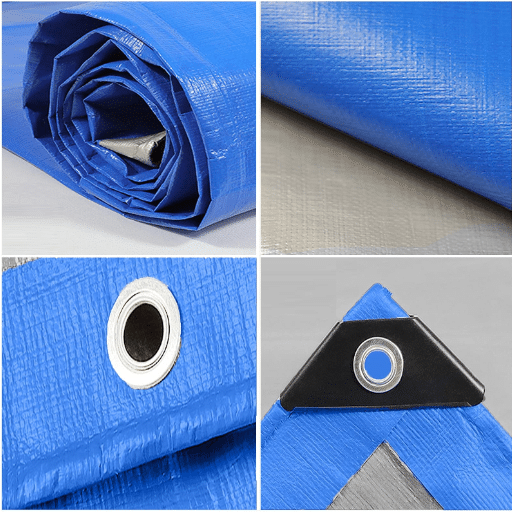
What is a Tarpaulin?
The tarpaulin, or tarp, as it is simply called, is a huge flexible sheet of strong, waterproof material. A mostly canvas cloth or a polyester sheet coated with polyurethane or a polyethylene tarp is one hard protective barrier against merciless weather had to come to their aid. Across multiple industries the tarp kept killing it simple! With reinforced edges and grommets running all the way around, the tarp can be tied down or fastened with high security. Because of their durability and versatility, tarpaulins are commonly used for covering goods, providing shelter, or acting as temporary barriers for construction or outdoor activities. Drifting toward the tragic realm of online fame is the role of these covers in disaster relief, eco-conscious projects, and custom solutions made to fit individual needs.
Common Uses of Tarpaulins in Various Industries
Accustomed to the high versatility and durability that the tarpaulin offers, it finds use in industries that are extremely diverse. They are often used in construction to provide cover for buildings under construction against the elements, materials, and workers. Tarpaulins help agriculturalists in protecting crops, hay, and equipment from the rain and sun, thereby extending their usability and preventing wastage. Transportation uses heavy-duty tarpaulins for cargo covering on trucks and trailers to keep goods safe while they are being transported. And the tarps are glorified event and entertainment industries to provide temporary covers to stages or outdoor venues.
🌟 Innovative Applications
Recent search trends have seen an interest in innovative tarpaulin uses, such as in disaster relief operations. They are often put into use in emergencies, such as for temporary shelter or to protect urgent supplies from entering weather conditions. Eco-awareness projects have also contributed to this demand as tarps are being recycled into sustainable materials or custom products such as reusable bags, covers, or even furniture. Such high versatility demonstrates yet again how tarpaulins continue to evolve as fundamental solutions tailored to modern needs in different industries.
Types of Tarpaulin Materials: PVC vs PE
🔴 PVC Tarpaulins
PVC tarpaulins are strong, durable, and weather-resistant and are best suited for long-term outdoor use, including covering vehicles, construction sites, and in the industry. They may have a coating layer to enhance their resistance from UV rays and moisture. On the other hand, PVC tarpaulins are heavy and environmentally unfriendly due to the chemicals used in making them.
🔵 PE Tarpaulins
A PE tarpaulin is an extremely light-weight, cheap, but water-resistant cover. Made of woven polyethylene resin fiber, these tarps are best suited for short-term uses such as makeshift shelters, agriculture cover, or covering materials in transport. PE tarps are greener than PVC tarps and can be better recycled, but they generally do not ebb well into longevity or medium-term durability as the PVC ones.
💡 Key Takeaway: In the end, it is the autonomies of the respective project that decides the preference of PVC versus PE tarpaulin, namely the requirements for durability, price, and environmental issues.
Choosing the Right Tarpaulin Manufacturer
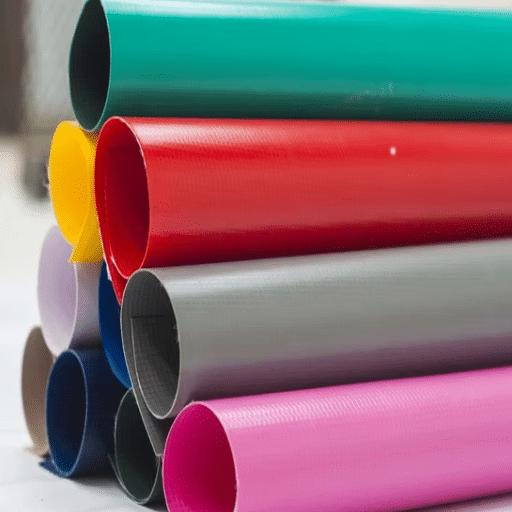
Key Considerations for an Appropriate Manufacturer
While deciding on a tarpaulin manufacturer, it is essential to examine a few important factors that can guarantee quality, reliability, and best performance. The following are some major considerations:
- 1
Reputation and Experience
Reputable manufacturers that have been in the business for decades mostly remain reliable. Try to find companies with good reviews and a good track record, and with ample experience with tarpaulins for a variety of uses.
- 2
Product Range and Customization Options
Choose a manufacturer that offers a full range of possible tarpaulin materials (PVC, PE, or others) and can customize the products for you. This way, you are assured that you will get products that fit your exact needs, in size, color, thickness, or any special features such as UV resistance.
- 3
Quality Standards and Certifications
Verify that the manufacturer adheres to recognized quality standards such as ISO certifications. For truly reliable manufacturers, they also have good-quality raw material and stringent quality control during the production process.
- 4
Environmental Sustainability Considerations
Nowadays, with increased awareness of environmental concerns, consider manufacturers who give importance to sustainability and use eco-friendly materials and on-site recycling practices. It is an important consideration, especially when differentiating between PVC and PE tarps.
- 5
Price and Value for Money
While considering price, one must also balance it with durability and quality of the product. A cheaper product will tend to incur repair or replacement costs in the long run.
- 6
After Sale and Customer Support
A manufacturer should offer excellent customer support during resolving any issues or queries after the purchase. Clear warranties and return policies will also add value to their product offering.
- 7
Production Capability and Delivery Times
You assess the production capabilities of the manufacturers to ensure they can handle big orders without affecting their delivery schedule. Many projects that require tarpaulins depend on quick production and quick delivery.
Currently, manufacturers with strong online presence, customer feedback, and digital catalogs have been increasingly favored. It is also the reputation of Inventures, Abrital, and HeavyDutySupply, which they have earned on the basis of quality variety and environmentally conscious manufacturing process methods. Scheduling time for such considerations and reviewing the most current information available online is an essential matter when choosing a tarpaulin manufacturer that is appropriate for your project.
Importance of Quality and Durability in Tarpaulin Products
Durability and quality are important factors with regard to tarpaulin products because these factors determine the lifespan and effectiveness of these materials in various applications. As per search engine trends, consumers are now turning toward heavy-duty tarpaulins for superior tear resistance, waterproofing, and UV-protection. High-quality tarps, in agriculture, construction, and transportation, need to withstand various environmental conditions and constant use. Indeed, durable materials reduce the frequent replacement process, saving businesses time and money, while also being eco-friendly by reducing waste. Hence, investing in a good tarpaulin will ensure better protection of goods and a cost-effective solution over time.
Evaluation of Manufacturer’s Reputation and Certifications
When assessing the reputation and certifications of a manufacturer, one must look for track records, customer reviews, and accredited credentials. Usually, reputable manufacturers are acknowledged by customers and review sites as well as through the input of third-party testimonialions. They have certifications worthy of mention, perhaps an ISO certification like ISO 9001 or some other quality management standard, to assure customers of a high standard in production and operational procedures. Checks with recent search information in online platforms will certainly shed light into trends, opinions, and past customer satisfaction levels in terms of product reliability. It would thus be wise to hire a manufacturing company with a good reputation and proper ISO certifications so that one may place his or her faith and expectation of quality in an impartial third party.
The Tarpaulin Manufacturing Process
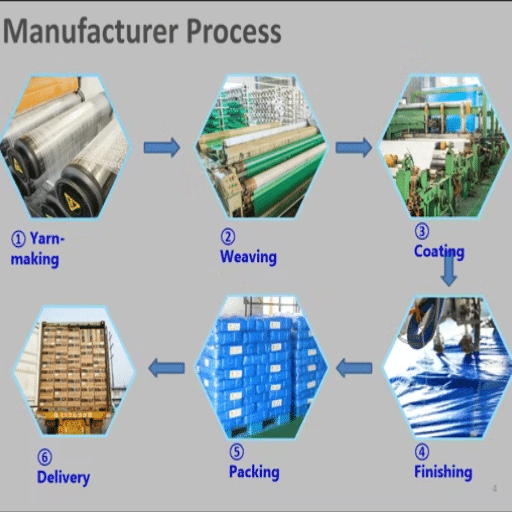
Steps Involved in Tarpaulin Manufacture
The tarpaulin manufacturing process is a scientific, a detailed, and a systematic procedure for ensuring the fabrication of good quality, weather-resistant material. The primary steps involved in designing and manufacturing tarpaulins are as follows as per the amalgamated data from recent search trends:
Material Selection
The process begins with a careful selection of raw materials, usually HDPE or PVC. Per latest search trends, customers are tilting towards UV-resistant materials and those that might be considered environmentally friendly.
Weaving
The raw materials are then woven into a strong compact cloth to ensure the tarpaulins resist wear and tear. The latest online information points towards a rise of demands for tightly-woven fabric due to better waterproofing and higher tensile strength.
Coating
After weaving, the fabric is coated with a protective layer, such as laminates or polymers, for better water resistance and durability. Search data points out the growing interest in anti-fungal and weather-resistant coatings to meet varying environmental conditions.
Cutting and Sealing
The fabric is then cut to specified dimensions and sealed at the edges to prevent fraying of the surface. Heat sealing is hailed in the search results as it can provide better durability to the edges.
Eyelets and Reinforcements
Finally, metal or plastic eyelets are attached, along with corner patches, for purpose of securing the tarpaulin during use. Reviews that are online frequently specify that reinforced tarpaulins with rustproof eyelets are preferred for heavy-duty work.
🎯 Manufacturing Excellence: By adopting traditional manufacturing methods with modern search trend input, manufacturers can respond to customer needs, such as sustainable materials and enhanced durability features. Aligning with customer needs ensures that produced tarpaulins are meeting smooth functional purposes as well as modern demands.
Quality Control Measures in Tarpaulin Production
A consistent quality of tarpaulin means the material having a stringent quality control being checked upon at every production stage. The manufacturers carry out tests for tensile strength, water resistance, UV stability, and tear resistance to make sure that the tarp remains durable under diverse conditions. A search of the latest data clearly shows that consumers demand eco-friendly materials and longer-lasting products, indicating the need to tighten the testing protocols around these attributes. To this end, additional checks should be added to the quality protocol to ensure that the tarpaulin materials indeed satisfy concerns of biodegradability. Upgrading the production facilities to meet these most modern demands now combines consumer choice with precise manufacturing standards to deliver dependable environmentally-friendly products.
Custom Tarpaulin Options and Their Benefits
Custom tarps come in a variety of designs, suited to specific requirements from different industries. These include UV-resistant tarps, which possess durable qualities, so they may be stretched out in direct sunlight for years upon outdoors use, say, in agriculture or construction. Waterproof tarps, on the contrary, are needed to protect goods and materials against adverse weather conditions. With respect to fire retardancy, tarps bring forth another layer of safety join in industrial and event setups while meeting regulative standards.
🌱 Sustainable Innovation
The demand for eco-friendly tarpaulins has been experiencing an upward surge, with consumer attention geared more towards sustainability, noted ‘s latest search trends data. Meeting this concern are biodegradable tarps and a few that are made from recycled materials, with each offering some measure of reduction to the environmental impact while still retaining usability. These kinds of innovations further the good of the environment, yet they also sit well with emerging sustainable preferences, making custom tarpaulin solutions somewhat useful and somewhat cutting edge.
Benefits of Using High-Quality Tarpaulins
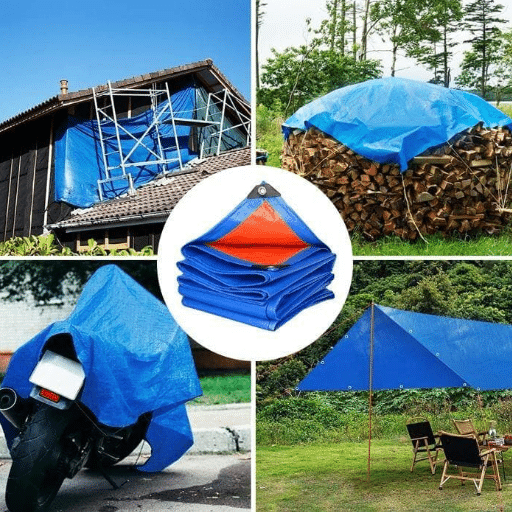
Heavy-Duty Protection for Various Uses
High-quality tarps provide tine protection on various applications because of the strength they offer to versatility in applications. Construction sites also need tarps to cover materials during inclement weather-heavy rains, sun, or winds. They also found utility covers for farm equipment, temporary roofs, as well as camping shelters. Recent search patterns have shown an increased interest on materials waterproof and UV-resistant tarpaulins-giving some insights into the urgency of products able to withstand harsh environmental factors. Being heavy-duty tarpaulins ensures protection for a lifetime, giving peace of mind to the buyer for industrial, commercial, or personal uses.
Waterproof and UV Resistant Features
💧 Waterproof Technology
Moisture being stricken through the fabric is the very condition of water-resistance, thereby making it impervious against rain and humidity. This technology ensures complete protection from water damage in various weather conditions.
☀️ UV Protection
UV resistance serves the purpose of resisting weakness in fabric and eventual discoloration due to long exposure to sunlight. This feature significantly extends the lifespan of covered materials.
According to the latest data from ‘s search engine, the rising queries for these features indicate a growing consumer preference for products that balance long-term durability with superior protection. This demand adequately accounts for the improvement of tarps with which one could contend with wet and sunny environment practically on time. What is the benefit of the features? It reduces maintenance cost, strongly increases lifespan of an item under cover and provides surety of assurance for several applications, thus making it an inevitable choice for industries and households.
Cost-Effectiveness of Investing in Quality Tarps
💰 Long-Term Savings
- ✓
Reduced replacement frequency due to superior durability - ✓
Lower maintenance costs over time - ✓
Protection against weather-related equipment deterioration - ✓
Environmentally friendly through waste reduction
Quality tarps are a wise investment because of their durability, weather resistance, versatility, and long-term advantage. Recent search trends and industry insights indicate that high-quality tarps lessen the ongoing costs brought about by frequent replacement and repair. Excessive wear and tear are minimized due to the strong tensile strength of these tarps, ensuring that the items covered are protected for long periods under any weather conditions. When equipment and material are protected by tarps and not allowed to deteriorate due to exposure, losses due to deterioration amount to huge savings; thus, tarps are a high-value investment. In other words, with increased utilization in industrial and household applications, such savings make for a technically sound cash-based alternate for premium tarps that pay off in the long run.
Leading Tarpaulin Manufacturers in China
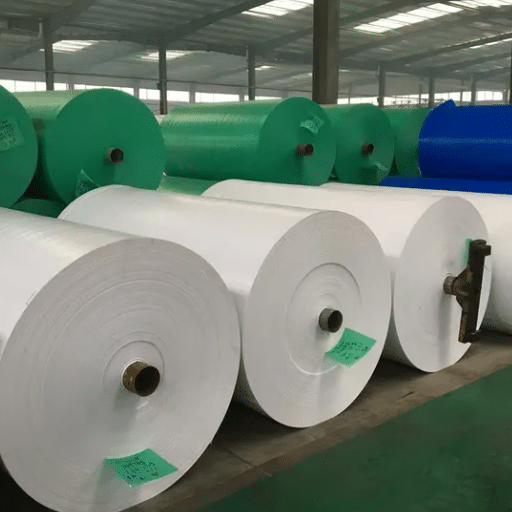
An Indian Tarpaulin Industry Overview in China
China is recognized as one of the largest tarpaulin producers and exporters globally on account of its heavy manufacturing base and technological edge. Recent data suggest steady growth in the Chinese tarpaulin industry with increasing demand seen in sectors such as agriculture, construction, logistics, and outdoor recreation. Chinese producers have been furthered by new-age materials and improved production techniques to produce tough tarpaulins which are marketed domestically as well as abroad. Also, considering low-cost production and other reasons, China has become a very attractive source for large companies in the outside world.
🏭 Industry Advantages: The country’s tarpaulin industry benefits from robust supply chains and governmental support for export-oriented activities. Some of the leading tarpaulin manufacturers that deal in a variety of products, such as polyethylene tarps, canvas tarps, and PVC-coated tarps, are based in Zhejiang, Guangdong, and Jiangsu. This spread of production extends Chinese manufacturers a variety in offering to suit the varied needs of their global customers, allowing them to compete effectively on price. Present trends bear out investments into ecological materials and recyclable products as the industry continues to pursue sustainability. In general, the tarpaulin industry in China continues to flourish as it embraces a changing market environment and technology.
Top Manufacturers and Offerings
Germany and China have one of the leading tarpaulin industries known for their quality and diversified showrooms. Some of the needed manufacturers and their product ranges are:
1
Shanghai Qinuo Industry Co., Ltd.
The firm offers tarpaulin ranging from PE tarpaulins, PVC-coated tarpaulins, and heavy covers on custom request basis. It also boasts of having an advanced set of facilities serving export purposes very well and concentrating on serving users from agriculture, construction, and warehousing sectors.
2
Taizhou Tianlu Plastic Co., Ltd.
Taizhou Tianlu is famous for eco-friendly tarpaulin, especially those made from recycled polyethylene materials. Keeping a very high focus on sustainability, they work with both domestic and international markets for the new high-performance products.
3
Zhejiang Mingfeng Industrial Co., Ltd.
It would be known for flame-retardant and UV-proof tarps offered by the manufacturer. These products find their use in transportation, outdoor shows, and roofing purposes. The company prides itself in its quality control and meeting international standards.
4
Linyi Qiluyuda Industrial Co., Ltd.
Linyi Qiluyuda produces durable multi-purpose tarps that cater mainly to heavy-duty use. Their product range includes waterproof and mildew-proof tarps commonly found in the industrial and agricultural sectors.
5
Shandong Hengchuang New Material Co., Ltd.
Shandong Hengchuang is focused on advanced polymer technology to forge high-strength tarpaulin solutions. Their innovative products include lightweight tarps with high weather resistance for long outdoor exposures.
🌟 Industry Leadership: These manufacturers are the forerunners of China’s increasing attention toward quality, customization, and sustainability in the tarpaulin industry for global competitiveness. With continuous investment in research and technology, they will be able to address the changing needs of consumers worldwide.
How to Find a Reliable Tarpaulin Supplier
🔍 Step-by-Step Supplier Research Guide
🌐 Online Research
Do a targeted search with keywords like “best tarpaulin suppliers” or “top-rated tarpaulin manufacturers,” along with your territory or particular needs. Suppliers well known on the Web and usually with high website traffic and positive reviews should be prioritized.
🏢 Company Verification
See if they have official websites that can provide detailed product descriptions, certifications, and clear contact information. Check whether the supplier specializes in the type of tarpaulin you are looking for.
🔬 Quality Testing
Ask for product samples if possible to check if the quality is to your satisfaction. This step is crucial for verifying the actual product quality before making larger orders.
Alibaba, Global Sources, and specialized B2B directories usually have final listings of suppliers with seller ratings, so they are very useful resources during your search. Go further and check up-to-date customer testimonials and review forums to nail down consistent remarks on reliability, delivery times, and customer support.
💡 Pro Tip: You want to know how much a supplier works on sustainability and innovation, as this speaks for their ability to keep up with industry trends and fulfill modern-day consumer demands. Online research accompanied by careful evaluation can surely land you in that reliable tarpaulin supplier of your choice.
Frequently Asked Questions
❓ What are some benefits offered by heavy-duty tarpaulins?
Heavy-duty tarpaulins are known for their outstanding durability and tear-resistance and find their applications in many, including outdoor uses in agriculture and construction. They can resist distortion due to harsh weather conditions while providing long care for your cargo or equipment. Many heavy-duty varieties resist UV that would otherwise degrade the tarp on sun exposure. They come in different thicknesses and GSM ratings for better customization to one’s specific need. Being a prime tarpaulin manufacturer, we make high-quality products that meet all industry standards for durability and reliability.
❓ How can I select a tarpaulin appropriate for my needs?
Choosing the right tarpaulin depends on the intended application. An HDPE tarp could work well for agricultural applications, being waterproof so that it protects crops from rain and sun. For this purpose, though, PVC tarps will be most suitable due to their high strength and resistance to tears. PE tarps are suitable when you require very light tarpaulins temporarily and are inexpensive. A good tarp supplier will provide samples and explain the specifications to help you choose the best material for your project.
❓ What kind of customizations can a tarp manufacturer perform?
Manufacturers of tarpaulins offer their clients customization options to give them what they want. It can be any random size or color for boats or a canopy. One may choose to have DA3 UV protection added to the tarp along with reinforced edges for further resistance. Some suppliers manufacture free samples on request to give buyers the scope to make an informed choice. And when a buyer can consult with their own professional R&D team, they can be certain that the product ultimately meets their expectations with regard to quality and functionality.
❓ How do I request a quotation from the tarp supplier?
Getting a quote from a tarp supplier is usually a simple procedure. Most suppliers have an enquiry form on their website where you can indicate your requirements, such as type of tarpaulin, size, and quantity. Describing the use can be helpful; for example, is it going to be a waterproof tarp for industrial usage or a light tarp for recreational usage? Once your enquiry has been entered, the supplier will normally respond with a factory price and information about the potential customizations. Be sure to inquire about the standards they follow for the quality of their products and what guarantees, if any, they offer.
❓ How long does a regular tarp last?
The lifespan of a tarpaulin varies due to the materials used and the weather it is subjected to. Carrying such polyethylene tarps of better quality, they last for a few years if used under good conditions. On the other hand, heavy-duty tarpaulins for tough industrial purposes outperform wear-and-tear and, hence, last longer. They do come with UV treatment so that the lifespan would elongate for degradation of tarps from sunlight. Periodic maintenance and proper storage would also increase the life of any tarpaulin.
📚 Reference Sources
Purdue MEP – Aero Industries
Highlights innovative tarpaulin systems and accessories for the heavy-duty trucking industry, showcasing a manufacturer’s success story.
Heritage University – Wholesale PVC Tarpaulin
Discusses Linyang, a leading PVC film and tarpaulin manufacturer, offering premium solutions tailored to industry needs.
GovInfo – Cotton Fabric Tents and Tarpaulins
A government publication discussing manufacturers, distributors, and users of cotton fabric tarpaulins and related products.
